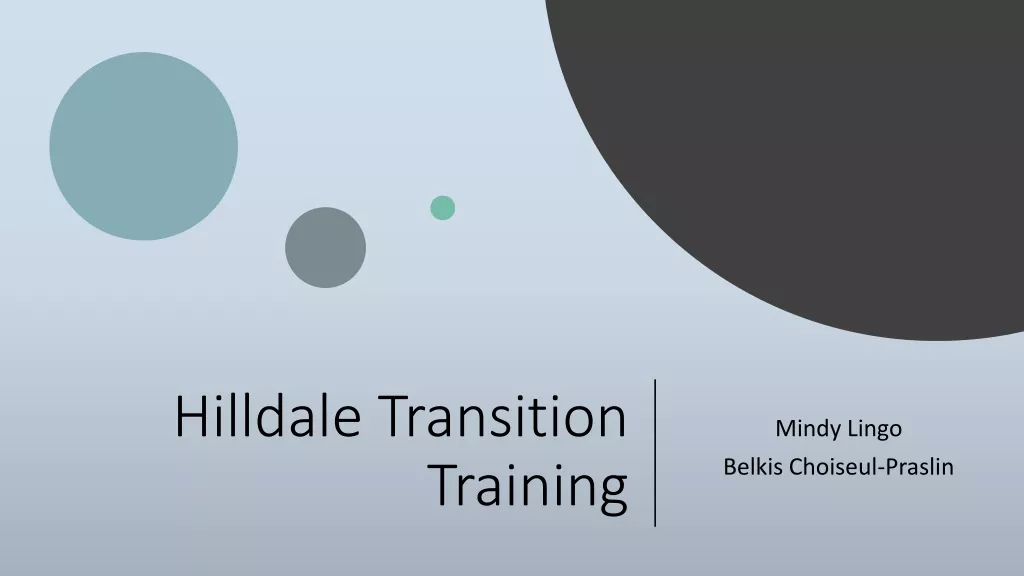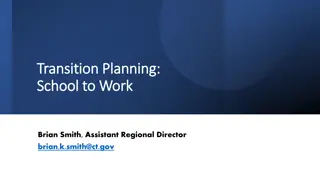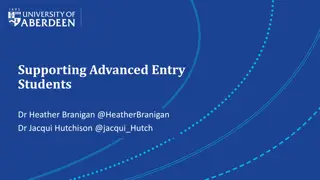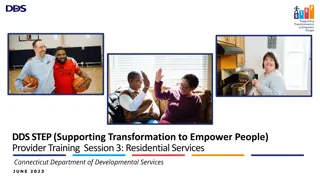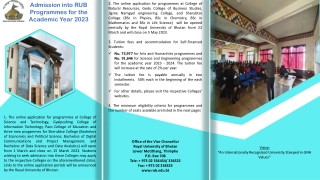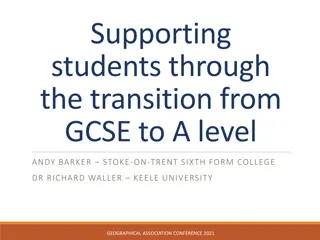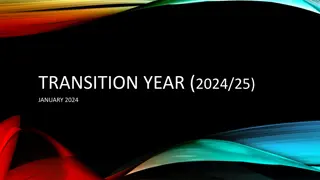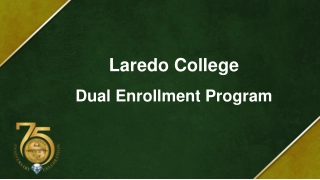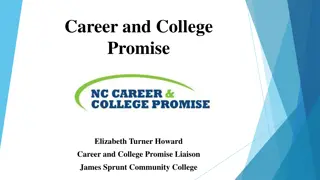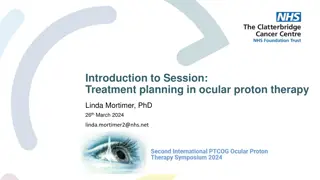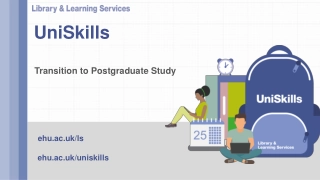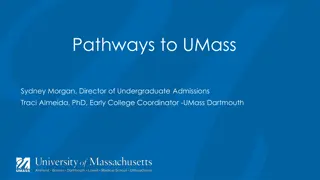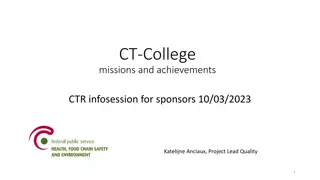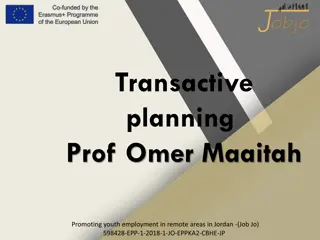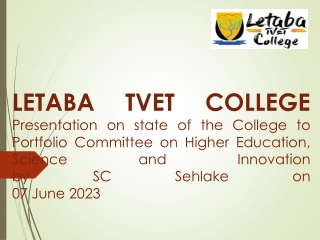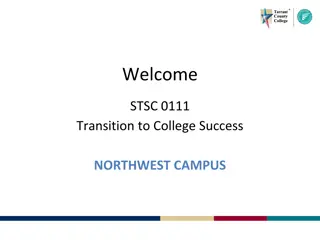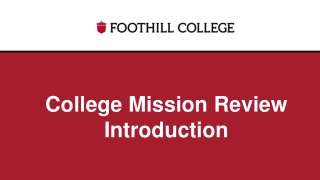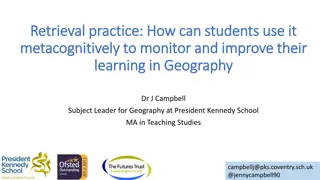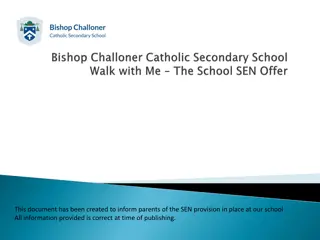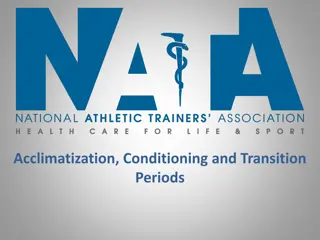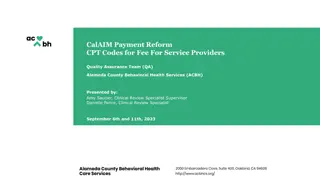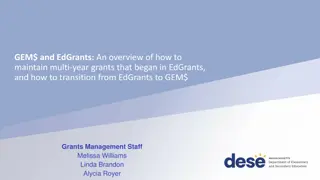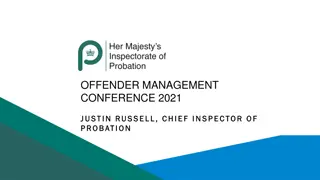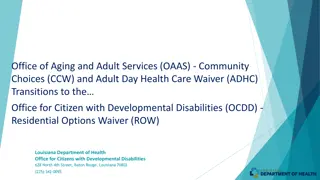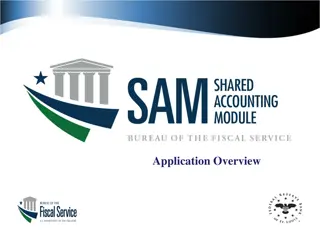College Transition Planning for Students with Learning Differences
Explore transition planning for students with learning differences like dyslexia, dyscalculia, dysgraphia, auditory and visual processing disorders, and nonverbal learning disabilities. Understand executive functioning challenges and characteristics of ADHD in educational settings.
Download Presentation

Please find below an Image/Link to download the presentation.
The content on the website is provided AS IS for your information and personal use only. It may not be sold, licensed, or shared on other websites without obtaining consent from the author. Download presentation by click this link. If you encounter any issues during the download, it is possible that the publisher has removed the file from their server.
E N D
Presentation Transcript
OPENING EXERCISE Go to www.menti.com Use the code 2510 1260
College Transition Planning for Students with Learning Differences "begin with the end in mind" Stephen Covey
DEFINING OUR TERMS LD - LEARNING DIFFERENCES difference in the way a person's brain is "wired." are as smart or smarter than their peers Dyslexia a language-based disability in which a person has trouble understanding written words. Dyscalculia a mathematical disability in which a person has a difficult time solving arithmetic problems and grasping math concepts Dysgraphia a writing disability in which a person finds it hard to form letters or write within a defined space. Auditory and Visual Processing Disorders sensory disabilities in which a person has difficulty understanding language despite normal hearing and vision Nonverbal Learning Disabilities a neurological disorder which originates in the right hemisphere of the brain, causing problems with visual-spatial, intuitive, organizational, evaluative and holistic processing functions LD online
EXECUTIVE FUNCTIONING difficulty with planning, organizing and managing time and space. has difficulty planning a project has trouble comprehending how much time a project will take to complete struggles to tell a story (verbally or in writing); has trouble communicating details in an organized, sequential manner has difficulty with the mental strategies involved in memorization and retrieving information from memory has trouble initiating activities or tasks, or generating ideas independently has difficulty retaining information while doing something with it; e.g., remembering a phone number while dialing LD online
ADHD principal characteristics of ADHD are inattention, hyperactivity, and impulsivity Feeling restless Blurting out answers before hearing the whole question Often becoming easily distracted by irrelevant sights and sounds Often failing to pay attention to details and making careless mistakes Rarely following instructions carefully and completely losing or forgetting things like toys, or pencils, books, and tools needed for a task Often skipping from one uncompleted activity to another. LD online
EVALUATION REPORT Evaluation is a process that helps parents and schools determine whether a child has a disability Identification. It will identify children who have delays or disabilities and need special education Eligibility. It will determine whether a child is a "child with a disability" under the Individuals with Disabilities Education Act (IDEA) Planning an Individualized Education Program (IEP). It provides information that will help parents and school professionals develop an appropriate IEP for a child. Instructional strategies. It will help determine effective strategies to help a child learn. Measuring progress. It establishes a baseline (present level of performance) for measuring a child's educational progress LD online
504 PLAN Covers individuals who meet the definition of qualified "handicapped" person Does not require that a child need special education to qualify Does not require an IEP, but does require a plan. "Appropriate" means an education comparable to the education provided to those students who are not disabled. Provides related services, if needed. LD online
IEP /OR OFFICIAL ACCOMMODATION PLAN Official Accommodation Plan (Private) IEP (Public) a written set of instructions that detail specific strategies and practices that will be used to communicate to teachers what strategies and practices will be used to ensure that a student's learning needs are met. Not an IEP Not Mandated by IDEA (The Individuals With Disabilities Education Act ) Each public school child who receives special education and related services must have an Individualized Education Program The IEP creates an opportunity for teachers, parents, school administrators, related services personnel, and students (when appropriate) to work together to improve educational results for children with disabilities. Mandated by IDEA (The Individuals With Disabilities Education Act )
ACCOMMODATION DIFFERENCES: HIGH SCHOOL/COLLEGE Postsecondary institutions are required to: Postsecondary institutions are not required to: Make all programs and services physically Provide academic modifications that alter the accessible to all students Provide auxiliary aids, notetakers, and nature of the course appropriate equipment Lower admission Accommodate the academic participation of qualified students with disabilities in college classes and activities Diagnose a disability or conduct testing Provide personal attendants Provide personal or private tutors Prepare IEPs
Part 2 - So Youre Working With Juniors... Adolescent Development & Academic Maturity Start of Another Transition Point Junior Year
Part 2 - Juniors With Learning Differences May have spent years hiding, and now are being asked new, uncomfortable questions. May or may not know about their LD and how it impacts their learning. May or may not know about the impact their accommodations have had on their learning. Junior Year May or may not be comfortable with their LD, talking about it, and understanding it. Likely have had parents in the driver s seat for many years. May be feeling a whole lot of anxiety about the college process and may be worried that their process might be different .
Part 2 - Juniors With LDs & Their Parents Many parents of high school-aged LD students have been advocating for their student for their entire career in school. Let s think about that for a moment... We are consistently pushing students to the fore of the college conversation (as we should), but what if the student isn t quite there yet? What if the parent isn t quite there yet? Some parents have knowledge of a college process from their own experience. Parents of students with LD are often worried that this knowledge won t be useful for their kid and their process. Parents aren t going to be able to communicate with disability support offices in college (more on this later), and are worried that their student might not be ready to take on this task.
Part 2 - Core Skill Areas To Work On With Juniors Advocacy Asking for help when needed. Preparing to speak with adults who may or may not understand LDs and their impact on learning. Awareness Knowledge of self and LD. Knowledge of needs that equal success. Executive Functioning Developing a specific system for info gathering and weeding through the info onslaught. Articulation Speaking about one s LD in their own words. Speaking about how LD impacts their learning & class experience.
Part 2 - Questions To Ask Juniors Can you tell me about your LD in your own words? Skip the evaluation jargon, what is your experience with your LD? How comfortable do you feel asking for yourself, particularly to people you may have just met? What kinds of accommodations do you find most helpful for you? Why? In what kind of space do you prefer to study? (Eg. Library, residence lounge, etc.) What does doing work at home look like for you? How much help from your parents or others are you getting? What are some of the accommodations you ve used in HS? How have those been most helpful to you? If you met a complete stranger for the first time, and had to ask them for help on an assignment, or had to ask them for some accommodation, how would you feel about doing that? What would you say or ask? Have you set up a meeting with our Disability Support Office yet? Let me show you where the office is on campus.
Break Out How does what you ve learned in these past few slides impact your practice? What would you change? What would you emphasize more?
Breakout Session #1 You will be divided into breakout of approximate equal size (5 to 7 people), and your group will remain the same for both breakouts. You ll have about 10 minutes to chat with your group. Please pay attention to your breakout room number as we may ask each room to pick a representative that will share with the entire group some of the highlights of your discussion. We encourage you to have your camera on and really lean in to these conversations!
For Those With Large Caseloads Caseloads are large in many public high schools which does not always allow as much time to work with students who have learning differences the way counselors would like (1) (2) Much of the work with students with Learning Differences requires interface with the Special Education teachers and working with 504 and IEP plans Good idea to bring in people from local colleges or universities to help talk about the transition from high school to college and what students and parents/guardians need to know (3) (4) Understanding the differences too between IDEA and ADA as well as documentation or information required to make a smooth transition to college
College Search for Students with LD Questions for Students to Ask Themselves Am I ready to begin making independent decisions? What am I looking for in a college? What kind of support services do I need to be successful? Then the more traditional questions as well Size Location Cost/financial aid Live on campus vs. commuting Majors Other characteristics that are important
Important Skills to Have Advocacy-being able to communicate one s needs and rights Academic Skills Reading and writing Study Habits Prepared for class and timely completion of assignments Personal Skills Interacting with others in classroom Social interaction on campus and in residence halls Ability to accept feedback/criticism/rejection Independent Living Skills Knowing medical needs How to do laundry Transportation Executive functioning skills-organizing/time management/initiating tasks
Admission Offices and Helping Students with LD Training of admission staff is a key component for success in dealing with all students of course, but helping admission staff understand the nuances of LD Meet with the administrator(s) who run the Office of Student Success or Disability Services to understand the process Know where the office is on campus and how to help families navigate the process Get annual updates; invite administrators to Open Houses and other events on campus
What to do after accepted? Acceptance to college-the language in the ADA is that the student must be otherwise qualified Academic standards in the classroom is the same for all students; instruction is not modified The college or university is responsible for behavioral standards/codes of conduct for ALL students Students MUST be able to advocate for self with minimal assistance Meet with the Office of Disability Services/Student Success Provide the most updated documentation/testing Participate in an intake session with the Office personnel to determine reasonable accommodations The student needs to speak here, not the parent-FERPA applies
Factors in College Success Resilience Social Communication and Interaction Executive Functioning skills Academic Ability Thierfeld, Brown 2013
Senior Year --> Preparing for the Transition Deciding where to enroll Meet with Academic/Disability Support Offices in advance Understanding grading systems and post-secondary expectations Parallel preparation Traditional college readiness and decision making LD support readiness How will your academic support be different from high school? Accommodation vs Modification Residential considerations? Executive Functioning plan
Accommodations Modifications ACCOMMODATIONS vs MODIFICATIONS Changing the conditions of an assessment A change in curricular expectations, levels of performance, or means of assessing Examples - extended time, recorded audio, typing instead of handwriting Protected by IDEA and ADA Provided in college under ADA Examples - fewer questions, waived credit , removal of deadlines, simplified material Generally not provided in college or the workplace Accommodation vs Waiver/Modification - check college requirements Example - foreign language vs culture class
Accommodations in College Extended Time Unlimited time is not realistic Deadlines don t change Distraction Reduced Testing Testing in different/smaller location or testing center Audio Books Notetaker or Recorded Lectures Calculators and computer in class Residential considerations - medical single room
Documentation Guidelines for College Accommodations Check individual college websites for exact guidelines Typically a high school IEP is not sufficient College disability offices make their own determinations about eligibility and reasonable accommodations based on evidence presented in the documentation Many students get reevaluated/retested after turning 16 years old so that evaluators can use the adult-normed WAIS vs WISC In-person vs virtual evaluation/testing options as needed
Additional items to consider and prepare before starting Medication Therapy - how to continue existing relationship or find support in new city Self-advocacy Independent living Social pressures and effects on habits Problem solving - when to reach out and to whom academic, social, and emotional resources Intersectionality - representation matters for retention and success What are they taking and when? How to refill? Interaction with drugs/alcohol? (don t be afraid of difficult conversations)
Break Out How does what you ve learned in these past few slides impact your practice? What would you change? What would you emphasize more?
Breakout Session #2 You will be divided into breakout of approximate equal size (5 to 7 people), and your group will remain the same for both breakouts. You ll have about 10 minutes to chat with your group. Please pay attention to your breakout room number as we may ask each room to pick a representative that will share with the entire group some of the highlights of your discussion. We encourage you to have your camera on and really lean in to these conversations!
National Center for Learning Disabilities (NCLD) Source -https://www.ncld.org/research/state-of-learning-disabilities/transitioning-to-life-after-high-school/ Source -https://www.ncld.org/research/state-of-learning-disabilities/transitioning-to-life-after-high-school/
REFERENCES Transitioning to Life After High School -NCLD https://www.ncld.org/research/state-of-learning-disabilities/transitioning-to-life-after- high-school/ National Center for Learning Disabilities (NCLD) https://ncld.org/ LD Online http://www.ldonline.org/ Understood https://www.understood.org/


